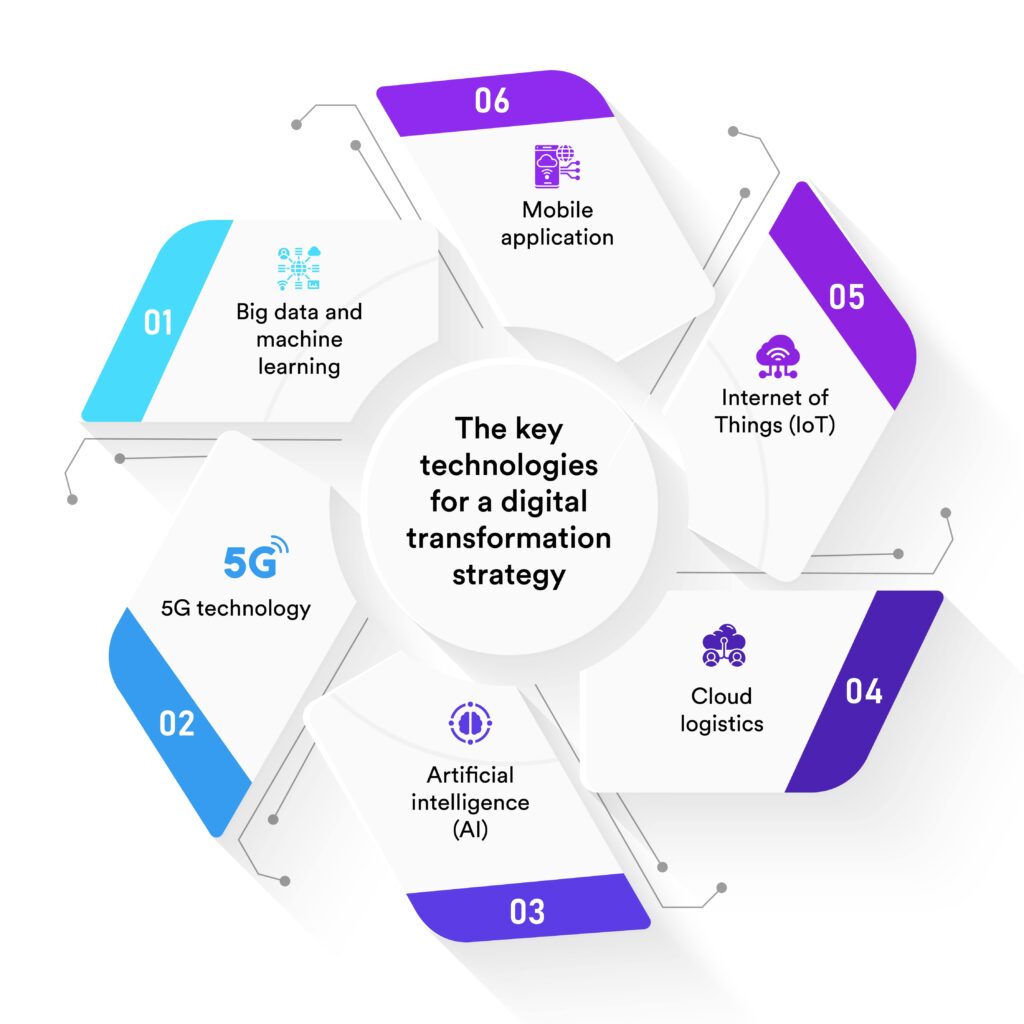Digital transformation in logistics was implemented very slowly. However, in recent years, the situation is evolving as new players, powered by tech competencies have carved out a distinct space in the market. By 2022, firms will devote 35% of their logistics business process outsourcing services budget to process automation, focusing on order, inventory, and shipment tracking.
If an online supply chain business wants to continue enjoying a competitive edge, then it needs to build, fund, and adopt a digital transformation strategy… Now.
The key technologies for a digital transformation strategy

The main operations where digitization can play an important role are data analytics, customer communication, operational processes, and vehicle and equipment monitoring.
Many players would like to substantially increase their market presence in a billion-dollar market with the help of key technologies, such as
- Big data and machine learning
- 5G technology
- Artificial intelligence (AI)
- Cloud logistics
- Internet of Things (IoT)
- Mobile application
The benefits of digital transformation in logistic business
Multi-core logistics management solutions are moving towards making global supply chains more customer-centric and sustainable. Digital transformation in the logistics business brings about a significant increase in operational efficiencies as shown below.
1. Role of Machine Learning and Big Data in logistic business
The volume and velocity of enterprise data keep getting bigger. This creates a need for cutting-edge technologies like advanced data analytics and business intelligence. In a business scenario, insightful decision-making requires the support of artificial intelligence and cognitive computing-based solutions. The logistics industry can overcome challenges like process optimization, supply chain management, end-to-end communication, cost control, and customer experience with Digital transformation enabled by AI and Cognitive Computing.
2. Role of 5G in Logistics Business
As 5G can connect more users than its predecessors, lesser space for more devices on the network will soon be a thing of the past. 5G can support over 1,000 devices or 100 times faster for every meter of coverage.
Smart devices can communicate with each other at greater efficiency with faster speeds, shorter lag times, larger areas of coverage, and lower power needs. It will accelerate IoT device applications and open up doors for new use-cases in logistics and more.
3. The Role of AI in Logistics Business
Many logistics companies can access vital information such as billing amounts, account information, dates, addresses, and parties attached to a load of unstructured invoice forms received by the company, all due to AI.
These are compelling reasons that drive logistics companies to adopt Artificial Intelligence (AI) for better service.
4. The Role of IoT in the Logistics Business
While contributing to IoT remote asset monitoring solutions and maintenance, the Internet of Things also provides actionable insights. IoT can integrate into core points of the supply chain. It eases the way for a better supply chain with end-to-end visibility.
IoT ensures high accuracy, and IoT-based logistics solutions can enable companies to monitor the location and speed of fleets accurately.
5. Role of Cloud Logistics in the logistics business
A good digital transformation technology takes cognisance of the power of cloud. Cloud logistics is witnessing a quick penetration in the market, with most logistics suppliers already using cloud administration. Logistics services are becoming available on a versatile, on-demand, pay-per-use model; when data moves to the cloud,
From procurement to billing, Domaincer provides a real-time cloud-based transportation management system that covers all logistics processes, making the entire process easy and affordable.
6. The role of mobile applications in the logistics business
A customized mobile app combines all the technologies. A feature-heavy mobile app can link progress and business systems. Logistics companies can improve services, booking, and customer support with a dedicated mobile app.
A logistics app with a location tracking feature can provide the flexibility to optimize routes and schedules for delivery.
Conclusion
The logistics companies need to be agile and efficient in order to thrive in a competitive market. And digital transformation is the one success driver that can help them achieve this goal. These advantages show why the logistics industry should invest in implementing new technologies with a digital transformation strategy.

